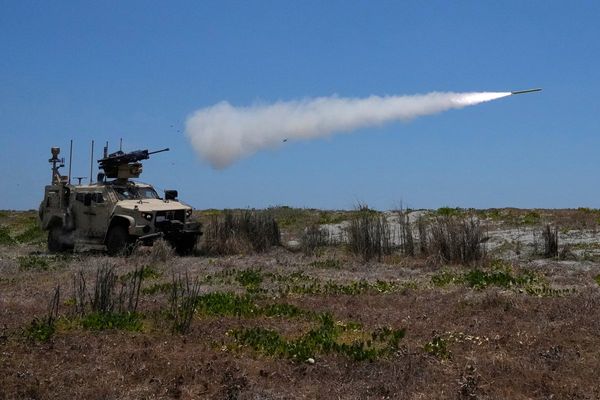Dow Jones futures tumbled Monday morning, along with S&P 500 futures and Nasdaq futures, but are off Sunday evening lows. Trump tariffs triggered the major indexes' worst week since the March 2020 Covid crash.
President Donald Trump said Sunday evening that he's "not intentionally" engineering a market sell-off.
The stock market suffered a meltdown last week, after President Trump announced tariffs vs. the rest of the world that were far higher than expected or even feared. The Nasdaq and Russell 2000 tumbled into bear market territory, with the Dow Jones and S&P 500 moving that direction. Treasury yields dived with crude oil plunging to the lowest since 2021.
Gold, utilities, insurers and other resilient sectors and stocks suffered sharp losses as bears hunted down survivors such as T-Mobile US and McDonald's.
That action, along with VIX fear gauge, might suggest a short-term bottom ahead. But it's a time to be extremely defensive, all or nearly all in cash.
Investors will get the CPI and PPI inflation reports this coming week. JPMorgan Chase, Wells Fargo and Delta Air Lines will report earnings, with commentary about consumer and business demand key. Nvidia chipmaker Taiwan Semiconductor will release quarterly sales.
On Sunday, Wedbush analyst Dan Ives, a long-time Tesla bull, slashed his TSLA stock price target by 43% to 315, citing Trump tariffs and brand woes. He cut his Apple price target by 23% to 250. Both price targets assume Tesla and Apple stock will rise.
Dow Jones Futures
Dow Jones futures fell 2.4%. S&P 500 futures lost 2.7% and Nasdaq 100 futures tumbled 3%. Futures are off Sunday evening lows, but have faded somewhat again.
The 10-year Treasury yield edged down to 3.98% after tumbling Sunday night.
Crude oil futures declined nearly 3%.
Remember that overnight action in Dow futures and elsewhere doesn't necessarily translate into actual trading in the next regular stock market session.
U.S. Vs. World: What's At Stake As Trump Trade War Intensifies
Trump Tariffs
President Trump said Sunday evening that he's "not intentionally engineering" a market sell-off. But he added, "Sometimes you have to take medicine."
Trump added that he won't make deals with other countries unless the bilateral trade deficits are eliminated.
On Sunday morning, Trump trade adviser Peter Navarro dismissed Vietnam's offer to cut U.S. tariffs to zero. "This is not a negotiation. This is a national emergency based on a trade deficit that's gotten out of control because of cheating," Navarro told Fox News on Sunday morning. He cited non-tariff barriers.
Trump and Navarro have often equated trade surpluses as proof of cheating.
Also Sunday morning, Treasury Secretary Scott Bessent dismissed the idea that tariffs will cause a recession. "I see no reason that we have to price in a recession," Bessent said on Meet The Press. He said he wasn't worried about last week's stock market sell-off. "The market consistently underestimates Donald Trump."
President Trump's 10% baseline tariffs on all trading partners started Saturday, with the much-higher bilateral rates for most partners beginning April 9.
Trump announced the massive tariff hikes on Wednesday, pushing average U.S. rates to the highest in a century. Those and other Trump tariffs will have a massive impact on the economy and prices, significantly raising the risk of recession or stagflation.
China announced major retaliation vs. the U.S. on Friday.
Fed Chief Jerome Powell said Friday that he still wants more "clarity" about Trump tariffs' impact on growth and inflation, which may be greater than perhaps previously expected. He stressed that he doesn't think the Fed needs to be in a "hurry" to respond, suggesting no rate cut at the May 7 meeting.
JPMorgan now expects the U.S. to fall into recession in 2025 due to Trump tariff impacts. Goldman Sachs now sees a 45% chance of a recession, but would expect a recession if most of the April 9 tariffs go into effect.
Join IBD experts as they analyze leading stocks and the market on IBD Live
Stock Market Meltdown
The stock market suffered massive losses in the past week, going almost straight down after the Trump tariffs announcement late Wednesday.
The Dow Jones Industrial Average dived 7.5% in last week's stock market trading, hitting an eight-month low, losing 3,910 points just on Thursday-Friday. The S&P 500 index plunged 9.1% and the Nasdaq composite 10%, both marking 11-month lows.
The small-cap Russell 2000 sold off 9.7% to the lowest since late 2023.
The Nasdaq and Russell 2000 are both more than 20% below their highs, entering bear markets.
Selling was broad and deep. A few stocks and sectors held up, but many of those came under pressure Friday as the market sell-off hunted down survivors.
The 10-year Treasury yield plunged 26 basis points to 3.99%, hitting a six-month low of 3.89% intraday Friday.
U.S. crude oil futures dived 10.6% to $61.99 a barrel last week, at the lowest levels since April 2021.
Tesla Price Target Slashed 43% On Tariffs; Apple PT Sliced 23%
Market Fear Gauge Soars
The CBOE Volatility Index, or VIX, skyrocketed to its highest level since August 2024, even marking its highest close since 2020. The fear gauge could be signaling at least a short-term market bottom soon, but it wouldn't have to be right away and it wouldn't have to last.
Sometimes a PG-13 jump scare isn't enough to trigger a bottom. With investors pricing in a strong chance of recession almost overnight, it's possible that market fear would need to get a lot higher.
Psychological indicators are secondary indicators. The major indexes and leading stocks are the primary gauges to follow.
ETFs
Among growth ETFs, the Innovator IBD 50 ETF plunged 10.5% last week. The iShares Expanded Tech-Software Sector ETF cratered 9.5%. The VanEck Vectors Semiconductor ETF plummeted 14.8%. Nvidia and Taiwan Semiconductor stock are major SMH holdings.
ARK Innovation ETF sold off 13.9% last week and ARK Genomics ETF 11.8%.
SPDR S&P Metals & Mining ETF crashed 14.4% last week. The U.S. Global Jets ETF descended 14.5%, with Delta Air Lines stock a big member. SPDR S&P Homebuilders ETF sank 3.4%. The Energy Select SPDR ETF cooled down 10.2% and the Health Care Select Sector SPDR Fund sank 6.4%.
The Industrial Select Sector SPDR Fund retreated 9.4%. The Financial Select SPDR ETF fell 10.2%, with JPMorgan and Wells Fargo key components.
Time The Market With IBD's ETF Market Strategy
What To Do Now
The stock market is in terrible shape, with the correction moving into or toward bear territory.
Cash is king, and there aren't even pretenders to the throne. Many defensive holdouts sold off by Friday's close. Just a handful of charts look relatively sound at this point.
JPMorgan Chase, Wells Fargo and Delta Air Lines will give an early read on how consumers and business are responding to the Trump tariffs and related uncertainty. Taiwan Semi sales will be interesting but earnings and guidance will come a week later.
The March CPI and PPI inflation reports also loom. It's unclear if Trump tariffs would be showing up in these reports yet, especially consumer inflation. Friday's University of Michigan consumer sentiment index is important, especially the report's readings on inflation expectations.
Perhaps most of all, the ongoing Trump tariffs saga will be in focus. Will more countries retaliate? Will other trading partners seek deals with the U.S., giving Trump a reason to roll back some tariffs.
Ultimately, what matters is the market reaction to the barrage of news. Lately, the reaction has been due south, but could change.
But do not get excited by a solid open, an intraday bounce or even a good session or two. The best days in history are in bad markets.
Work on your watchlists, focusing on relative strength.
Read The Big Picture every day to stay in sync with the market direction and leading stocks and sectors.
Please follow Ed Carson on Threads at @edcarson1971 and X/Twitter at @IBD_ECarson for stock market updates and more.







